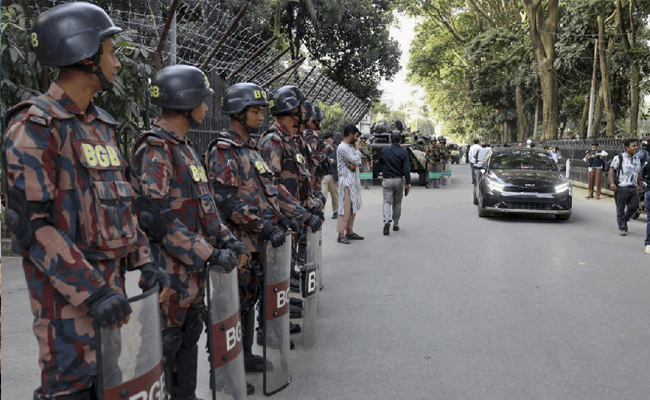Bengaluru, June 28: The High Court of Karnataka has refused to quash the FIR against Congress party leaders Rahul Gandhi, Jairam Ramesh and Supriya Shrinate for the alleged copyright violation of music from the hit film KGF Chapter-2.
The single judge bench of Justice M Nagaprasanna pronounced the judgment on Wednesday, dismissing the petition filed by the three Congress leaders.
M Naveen Kumar of MRT Music, a sister concern of Lahari Music, had filed the complaint at Yeshwantpur police station in Bengaluru alleging that the music from the film, to which it has the copyright, was used by the Congress party in a promotional video of 'Bharat Jodo Yatra'.
The HC in its order dismissing the petition said, "The petitioners appear to have tampered with source code without permission, which would undoubtedly amount to infringement of the copyright of the company. The petitioners seem to have taken the copyright of the company for granted. Therefore prima facie all these as a matter of evidence has to be trashed out in an investigation."
ALSO READ: ‘Anna Bhagya’ scheme beneficiaries to get money instead of 5 kg rice for now: Minister KH Muniyappa
The FIR was registered under sections 120-B (criminal conspiracy), 403 (Dishonest misappropriation of property) 465 (forgery) r/w Section 34 (criminal act with common intent) of Indian Penal Code, Section 33 of Copyright Act and Section 66 of Information Technology Act.
On behalf of the Congress leaders, it was argued that the issue was related to copyright infringement but a criminal complaint was filed and immediately an FIR was registered by the police. "Copyright is statutory right. In the absence of a cognisable offence (the) FIR is bad in law," AS Ponnanna, the counsel for the party leaders had argued.
A related suit in a commercial court was filed leading to the order to freeze the social media accounts of the Congress party. The HC set it aside after an undertaking by the party to remove the offending videos from its social media handles.
Let the Truth be known. If you read VB and like VB, please be a VB Supporter and Help us deliver the Truth to one and all.
Ahmedabad (PTI): Six months after the AI-171 plane crash, the B J Medical College hostel complex in Ahmedabad stands as a haunting reminder, with its charred walls and burnt trees replacing the once lively chatter of students with an eerie stillness.
Scattered across the crash site are grim remnants of daily life - burnt cars and motorcycles, twisted beds and furniture, charred books, clothes and personal belongings.
The Atulyam-4 hostel building and the adjoining canteen complex stand abandoned, with entry strictly prohibited.
For residents near the site, memories of the incident still linger, casting a lasting shadow on their lives, with some of them saying they are still afraid to look up at the sky when an aircraft passes overhead.
On June 12, Air India flight AI-171, a Boeing 787-8 Dreamliner bound for London, crashed moments after take-off from the Sardar Vallabhbhai Patel International Airport, killing 260 persons.
The aircraft slammed into the BJ Medical College hostel complex in Meghaninagar, turning a lively student neighbourhood into a landscape of ruin and grief.
"The area now lies very silent, only a few birds chirp here," Sanjaybhai, a security guard deployed at the premises by authorities to prevent trespassing, told PTI.
Mahendrasingh Jadeja, a general store owner whose shop is just 50 metres from the point where the aircraft struck, described it as an unimaginable calamity. "In all my years, I have never seen anything like this."
Pointing to a tree behind his shop, the 60-year-old said the aircraft first struck there before crashing into the hostel building.
"It was a scorching summer afternoon. Not many people were outside. When I heard a loud crashing sound, I ran out of my shop. We were all terrified," he recalled.
"Even today, we instinctively look up whenever a plane passes overhead," he added.
Another local, Manubhai Rajput, who lives barely 200 metres from the site, said he witnessed the horror unfold on June 12.
"The plane was flying unusually low. Before I could understand what was happening, there was thick black smoke and a deafening crash," he said.
For over three decades, Rajput and his neighbours lived close to the airport without giving much thought to the aircraft overhead.
"We never looked up at the sky. But that day is etched in my mind. The plane hit a tree first, and then there was a loud sound," he said.
Rajput recalled how hundreds of locals rushed to the site even before police, fire services or the Army arrived.
Tinaben, another resident of Meghaninagar, said she never imagined something like this could happen in Ahmedabad.
"Despite being close to the airport, this area always felt safe," she said.
As an aircraft roared overhead during the conversation, Tinaben paused, looked up nervously and said, "It's still scary."
A senior official of Civil Hospital Ahmedabad, speaking on condition of anonymity, said the state government has yet to decide what to do with the damaged site.
Currently, investigations are going on and the site is strictly prohibited for people, he added.





